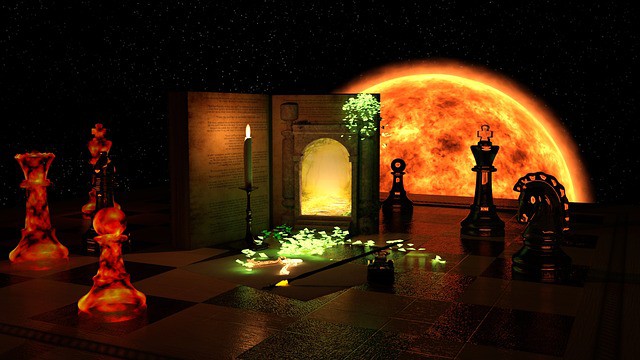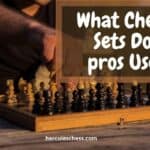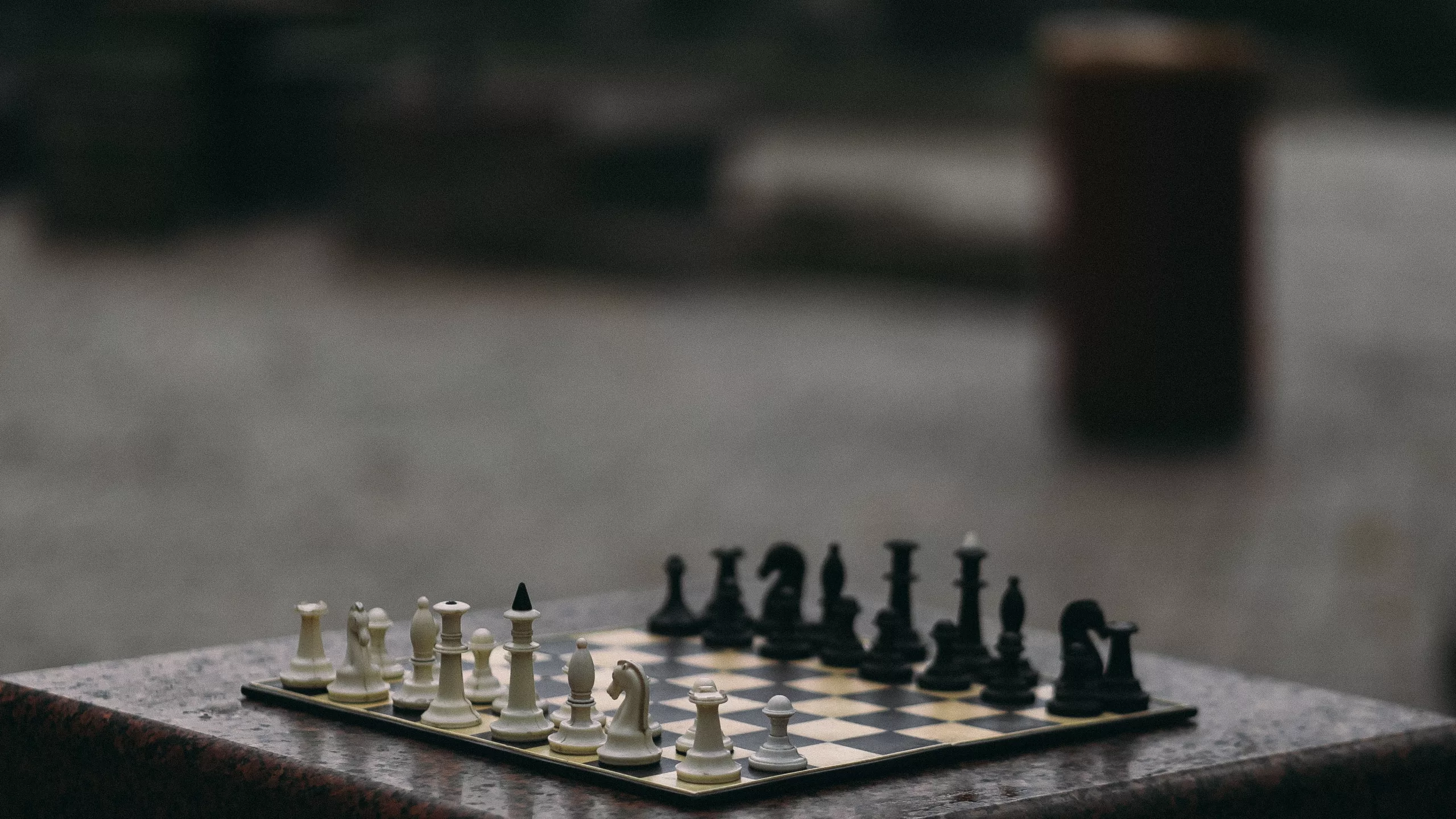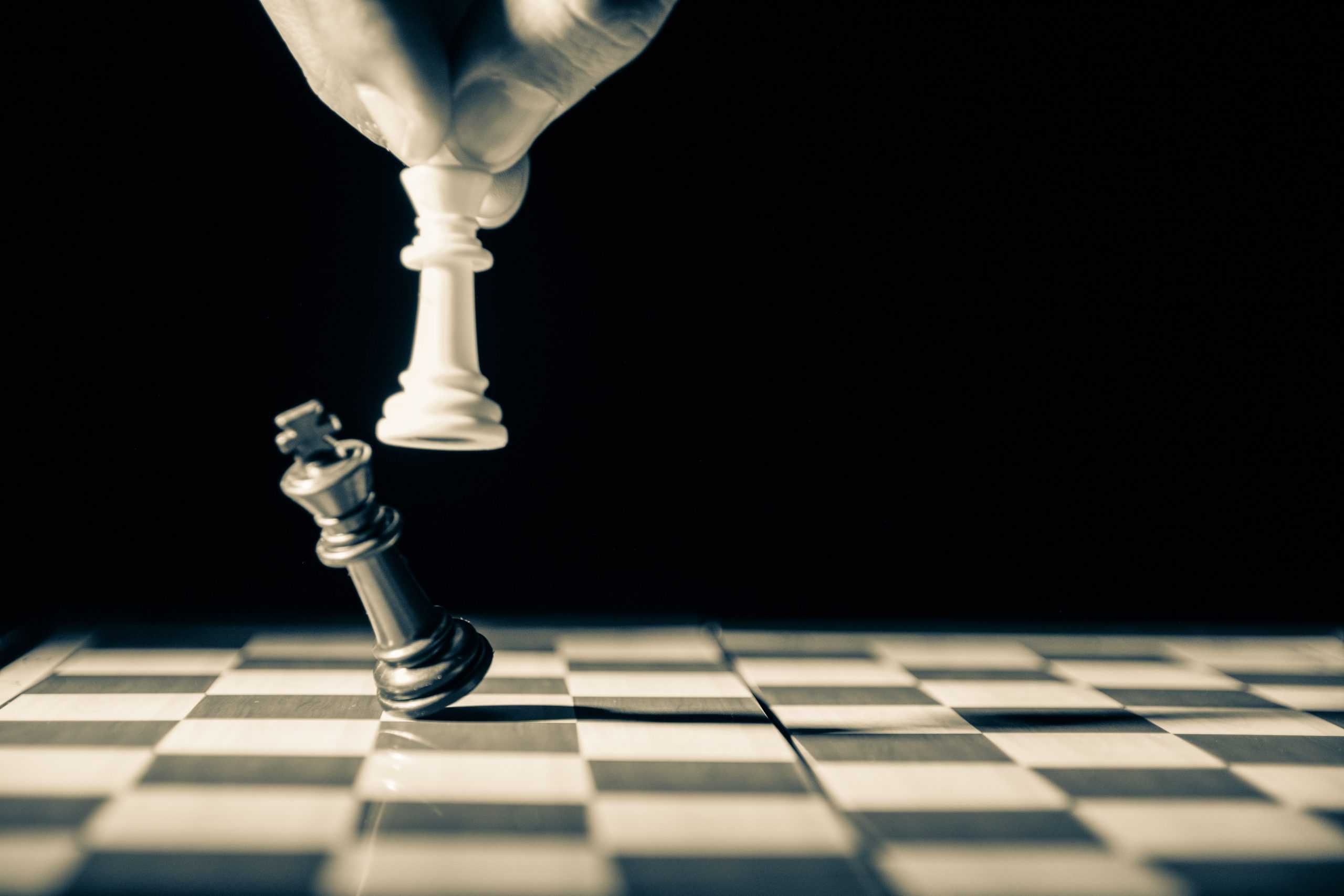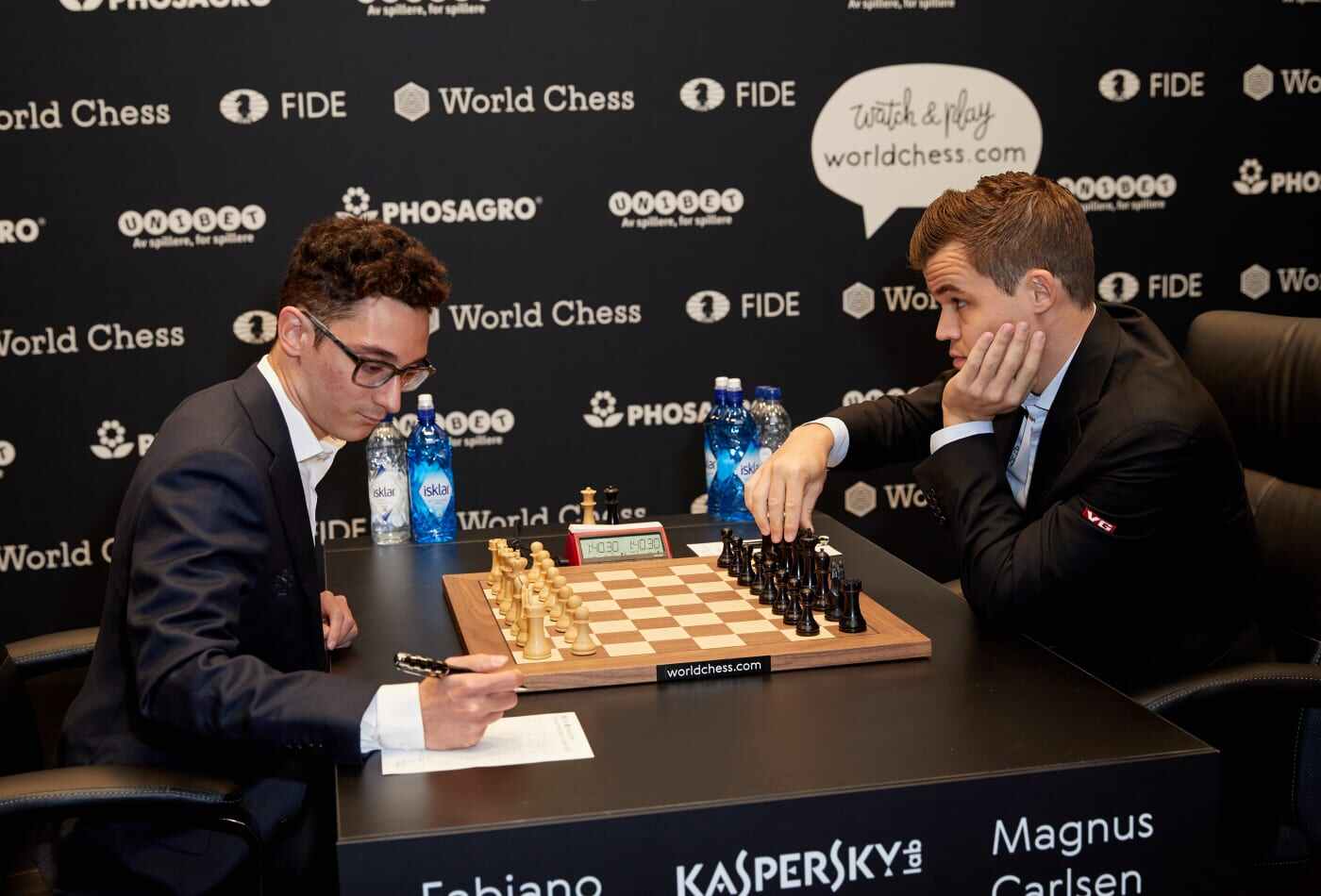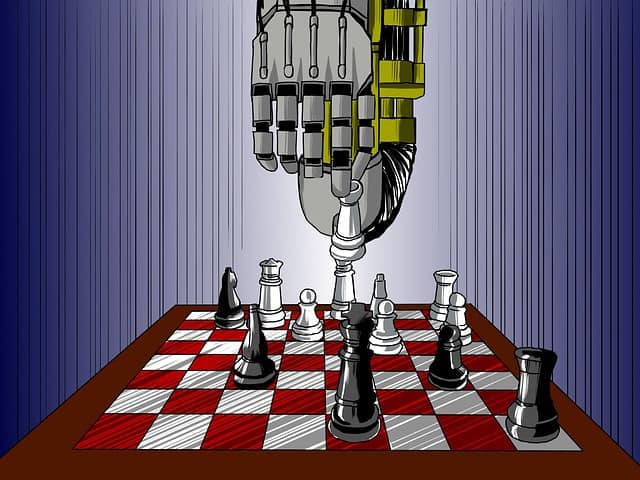Do you want to know how to win at chess? Well you’ve came to the right article. To win at chess you must first develop a correct thinking system; one which is adapted by many elite chess players including FMs and grandmasters. There is a path that must be taken in order to improve and win a lot more games. A general way to win at chess is to use chess software as a tool to analyze chess games.
However, before we start to consider the general ways to use chess software as a tool to become a better chess player, we need to look at a road map first. I’ve spent the best part of two decades teaching other chess players how to use computer chess programs and, along the way, I’ve learned something too: I’ve learned how people learn about chess.
Don’t rush for a scorecard to try to figure that one out. I can explain it to you pretty simply.
To win at chess, you must do these three things:
- Study
- Practice
- Analyse
You study chess to learn new concepts, you then play games to put those ideas and concepts into practice, then you analyze your performance to learn what you need to study.
Every step of the process leads to another step. So the path to improvement is actually a circle:
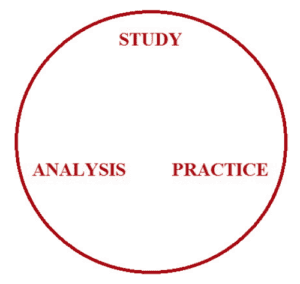
…with the steps following each other in clockwise order around the ring shown above. You might be saying, “But that never ends!”; if so, you’re correct. Chess is a lifetime pursuit, and there’s always something new to be learned no matter how good a player you become.
That’s exactly why chess is so cool. You never stop learning. Let’s look at each step of the learning process and figure out how it works. Trust me, understanding the process will help you use it to your advantage later.
How To Win At Chess
1. Practice
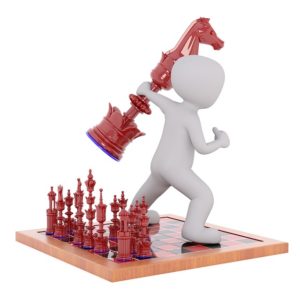
The term “practice” refers to any time you’re playing chess. It might be a casual game with a friend on your lunch break, an online blitz game, the final round of a weekend tournament with a cash prize on the line, or solving chess problems in a chess software program.
Any time you’re looking at a chess position, analyzing it, weighing possibilities, using your noodle to find a good move, you’re practicing chess. That is, you’re putting your chess knowledge to a practical test. Nobody gets better at chess without playing chess. That applies to pretty much everything in life: you can read books and magazines about skydiving all day long, learning everything you can about how to do it, but none of that study means a thing until you step out of the hatch at 14,000 feet.
Acquiring knowledge for its own sake is nice, but it’s even better when you put that acquired knowledge to practical use. And, in this case, it means playing chess, as much of it as you can. When you play a game you’re not just competing against an opponent, you’re also testing yourself (some would argue that you’re primarily testing yourself), pitting your accumulated knowledge and skills against those of another player (whether it’s a human player or a machine makes no difference). Practice leads directly to the next stage of the learning cycle…
2. Analyse
When we talk about analysis, we’re talking about the process of reviewing the games you played during the “Practice” stage. You should always review your games, as soon as you can after you’ve played them, and especially review your losses.
Analyzing your games means looking at them carefully to figure out what you did right, what you did wrong, and (most important of all) how you could improve upon what you did.
When you won that last game, was it because your opponent blundered in time pressure? Did he make a mistake or have some positional weakness (say, a backward pawn) that you recognized and capitalized on? Or, best of all, did you force him to create that weakness with your own good move(s)?
Conversely, when you lost a game, was it because you lost on time? Did you have a positional weakness which your opponent exploited? Did your opponent drop a bomb on you by hitting you with a tactical shot that you never saw coming? When did you first get a bad position? was it the middlegame or maybe the endgame?
Analyze your games by reviewing them yourself, then have another player (human or electronic) look at them. Look at your games closely; try to discover why you won or lost. Find the answers to the kinds of questions posed in the previous two paragraphs. When you find them, you’re ready for the next step…
Take this FREE course: How to analyse your chess games
3. Study
We analyze our games to try to determine why they turned out the way they did. We search for our strengths but, more importantly, we strive to isolate out weaknesses. Only by finding out what we’re bad at do we discover what we need to study in order to improve.
In my latest post, How to get better at chess, I discussed several tips which are “road markers” you can use to chart your general course, but at some point you’ll need to zero in on some specifics.
It’s one thing to say “Study positional chess”, but if you start to see a tendency in which you leave backward pawns around that your opponents pick off in an endgame, that knowledge provides you with two specific study areas right there: you should study pawn structures, and especially pawn structures as they apply to the endgame.
Instead, if you’re cooking along with what you think is a decent position and suddenly your opponent hits you with a three-move combination that wins your Rook and you tend to get blasted off the board in a similar way game after game. That’s a big ol’ red flag waving in the breeze with the words “Study your tactics!” emblazoned across it.
The mistakes we uncover in the Analysis part of the cycle will tell us what we should concentrate on in the Study phase. Lots of players love to study and memorize opening variations, but if you’re getting popped by a tactical shot in middlegame after middlegame, it’s time to put that opening encyclopedia back on the shelf and break out a tactics training CD instead.
Not only will you learn to recognize tactical opportunities when you have them, but you’ll also be able to spot recurring problems in your own positions which are providing these opportunities to your opponents. If you can spot ’em, you can fix ’em the next time you play, which brings us back to…
4. Practice
And so it goes, in a never ending cycle of playing and learning. It’s necessary to note here that these stages of the cycle often overlap. You might play in a four round weekend tournament on Saturday, analyze the games on Sunday and discover (in combination with games you played at the chess club over the last couple of weeks) that you need to brush up on your minor piece endgames.
So you start working through some endgame books on your lunch break and, at home in the evening, setting up some of these positions in your favorite chess program and playing them against the computer. By the next weekly Wednesday chess club meeting you’re still working through the examples in your endgame book, so “Study” and “Practice” overlap. Later, you don’t get the chance to review your chess club games until Friday, but you’re still not finished looking at minor piece endings yet, so “Study” and “Analysis” are now overlapping.
Regardless of the potential overlap, the chess learning cycle tends to follow the exact clockwise pattern in our previous illustration. You practice what you know by playing games, you learn what you don’t know by analyzing your games, then you use your study time to fill those gaps in your knowledge.
Final Verdict – Your Winning Plan
SO WHAT DOES A CHESS PROGRAM HAVE TO DO WITH IT?
A good computer chess program, if you use it right, will help you with all three areas of the learning cycle which would lead to winning more games. The “Practice” part is pretty self-evident: you can play chess anytime you want without trying to find a human opponent. The “Analysis” angle is potentially the single most important reason to own a good chess program: the chess engine can analyze your games and help you spot problems in your chess play (and, if you’ve done the “self analysis” part right, may just confirm what you’ve already spotted when you went over your own games).
Chess programs, depending on their individual features, can help with various aspects of the “Study” part of the cycle, often containing searchable databases in which you can find hundreds of replayable sample games, along with the ability to set up a position and have a strong chess engine analyze it, chess tree functions to help spot problems in the early part of your game, and so on.
In short, a chess program can have everything to do with your own learning cycle. The most important thing a chess program can provide for you is time. Few of us have limitless time to spend on chess; more important things like work, family, social activities, take precedence.
The limited time we can spend on playing and improving at chess is very precious, and a good chess program can help you make the most of your limited study and playing time.
Thank’s for reading How to win at chess 🙂 I hoped you got a few takeaways. Cheers!
Recommended Training Course For Winning Chess
If you are seriously ready to take your chess skills to the next level and beat stronger opponents, then make sure you take the course “Your Winning Plan” by GM Igor Smirnov
He lays out everything you need to know to construct a feasible plan during your games. This will create better chances to achieve victory! Click here to see full review of the course
